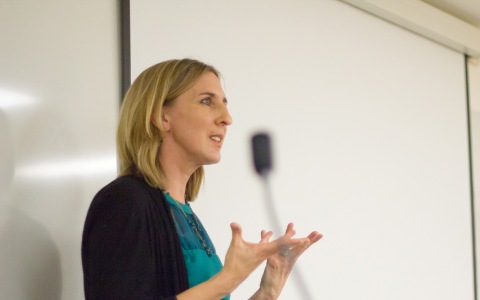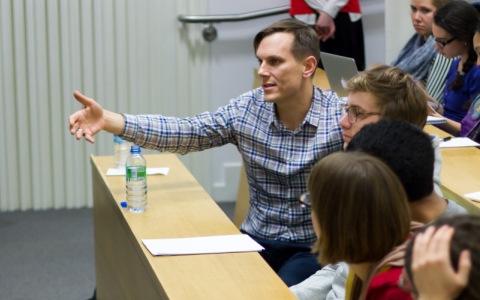Dr Shakman Hurd warns ‘religious freedom’ laws could produce ‘more harm than good’
by - 15th November 2013

LEADING political theorist Dr Beth Shakman Hurd warned students at London School of Economics that passing religious freedoms laws could lead to religious persecution and ultimately result in ‘more harm than good’.
Addressing a full lecture theatre on Wednesday evening, Dr Shakman Hurd explained governing difference through rights has consequences that shape both politics and religion.
Despite most people taking a ‘rather benign view’ of religious freedom, viewing it as a ‘social fact that can be objectively measured and achieved’, Dr Shakman Hurd argues this view is based on false historical and cultural assumptions.
‘It is far from evident to me that a world in which religious freedom holds sway will be one in which violence poverty and despair are vanquished,’ she said.
The scholar argued the logic of religious freedom puts pressure on the individual to define one’s identity in religious terms.
‘Are you this or are you that? You need to know what you are in order to know who you are and how you fit in.
Dissent
‘Individuals with multiple affiliations, with mixed backgrounds or those dissenting from recognizable forms of religion are not easily accommodated into these new worlds.
‘Melanie Macalister an American studies scholar George Washington University describes this dynamic as it was unfolding in her interviews of Sudanese refugees in Egypt.
“If you want help”, they told her, “be a persecuted Christian”’.
The author claimed emphasizing religious freedom during the Arab Spring has also realized a political logic in which being Christian or Muslim, Sunni or Shia carries more significance than being pro or anti democracy.
Religious freedom laws can therefore naturalize the very boundaries of difference that they also seek to diminish, she said.
Using the Rohingya people as an example, she argued, ‘Promoting religious rights and freedoms singles out the Rohingya on religious grounds, sets their identity as Muslims rather than as Burmese citizens or humans. This emphasis on the difference religion allegedly makes plays directly and tragically into the hands of the rival exclusionary Buddhist nationalist origination known as 969.
‘969 depends deeply on the popular perception of the hard and fast lines of Muslim and Buddhist difference. 969 has called for comprehensive social, economic and political exclusion of the Rohingya from Burmese society in the name of the religious freedom – they use those words.’
‘To counter this claimed narrative, the Rohingya need to be included in Burmese society as humans rather than Muslims. It's not at all clear that outside political advocacy for religious rights and freedoms helps to achieve this objective, in fact I’m afraid it may achieve the opposite.’
The professor said that governments and institutions which recognize some, but not all belief systems as religions, are defining what it means to be religious and incentivize groups to become an officially recognized religion, in order to receive protective rights.
She argued its ‘often very difficult’ to classify people in neat groups of believers or non-believers in a single faith tradition.
‘To enforce a right to religious freedom empowers bureaucrats to decide what constitutes religion vs. non religion, who counts as a religious subject or association and who will speak on their behalf. Religious freedom it would seem could also be the making of religious persecution.
‘Religions that the US disfavors are more likely to be classified as extremist while others are registered and protected as orthodox. This is the politics of religious freedom.’
She also argued that defining religion by what an individual believes originates from seventeenth-century Europe and is not universal.
‘Governing difference through the rights of belief are not protecting privileges, individuals and communities that subscribe to a particular modern liberal understanding of faith.’
Dr Shakman Hurd’s interest in what she calls the ‘religious freedom frenzy’ was born when she realized, ‘Everyone is for it! And I’m interested in things everyone is for.’
Insightful

Speaking after the lecture, Ibrahim Mukhayer a PhD student in the social anthropology department of LSE described Dr Shakman Hurd’s insights as ‘excellent’.
Lamenting how social anthropology ‘hasn’t had an input on discussions of religion and power’ Ibrahim argued, ‘what she really expresses is an important way in which these discourses between religion and power are in control of religion discourse but also the politicization of religious identities.’
John Madeley, a retired tutor who lectured on political science at LSE agreed the consequences of Dr Shakman Hurd’s ideas needed further thinking, but said ‘she raised a number of very powerful points. I thought it was a very striking claim and shocking.
‘Religious freedom is creating an image of the world that’s deeply unhelpful. What you do about it is another question, and also how do you explain how we got here?’
Zahra Memirian who was visiting the UK from Iran commented: ‘I think she had an interesting idea but I was lost in the development. Questioning the idea is a good step but I couldn’t follow the development and I don’t think she did either.’
- Log in to post comments
